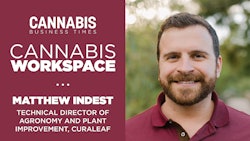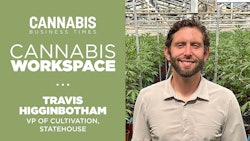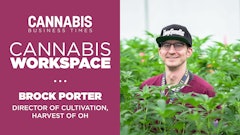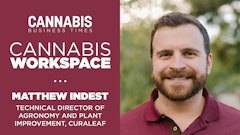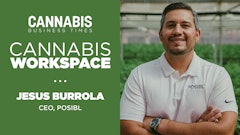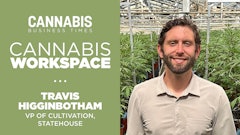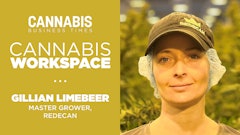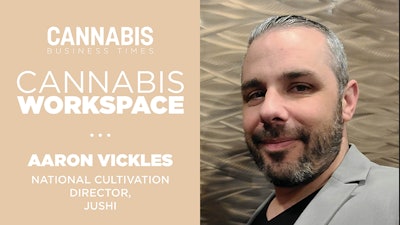
Name: Aaron Vickles
Location: Scranton, Penn.
Title: National Cultivation Director, Jushi
One word to describe your cultivation style: Meticulous
Indoor, outdoor, greenhouse or a combination: Indoor
Can you share a bit of your background and how you and your company got to the present day?
I was born and raised in Denver, Colo. My cannabis career began in 2009 when I started working as a trimmer with The Clinic to pay my way through college. I trimmed for a short period of time, but it turn[ed] out [that] I’m not very good at sitting for eight hours a day, so I asked if I could join the cultivation team. Josh Malman, who is now Jushi’s [vice president] of cultivation, oversaw The Clinic’s cultivation department at that time. He brought me onto the cultivation team, where I started from the ground level, doing nearly every task in the gardens. Over time I worked my way up the chain from [being] a grower assistant to eventually taking over as grow manager for the company.
I worked with The Clinic for almost nine years, until Josh came to me one day with an opportunity in Northern California with Legion of Bloom; nothing but good things to say about those guys. I worked for two years helping to get their Oakland facility set up, and served as the company’s project manager, chief compliance officer and safety officer before reconnecting with Josh and learning about a new opportunity with Jushi. In late 2020, I came on board with Jushi as their national cultivation director and moved from the Bay Area all the way to Scranton to help get the Pennsylvania facility turned around. Once the site was stabilized and had a local director on board, I joined Josh on the road to help get our six other facilities up and running. I have been with Jushi for over two years now and still love it every day.
What tool or software in your cultivation space can you not live without?
We couldn’t live without our automated fertigation systems and building management systems (BMS)—that includes environmental controls, HVAC, lighting, etc.—and our mechanical/electrical systems. These are the key elements allowing us to properly manage our large-scale operations. It’s extremely helpful to be able to dial in our crop steering techniques, recipes, lighting, environments, etc.
What purchase of $100 or less has most positively impacted your business in the last six months?
Jeweler’s microscopes have been a game changer for our cultivation teams. It’s one of the best investments cultivators can make for their grow operations. As our flowering plants get closer to harvest, we measure ripeness through historical data, but also through trichome analysis. These microscopes allow us to track, analyze and pinpoint the best time range to harvest our cultivars.
What cultivation technique are you most interested in right now, and what are you actively studying (the most)?
I’m really interested in tissue culture at the moment. With the large catalog of cultivars that we have at our facilities, it's important to be thinking about long-term genetic storage for the preservation of your high-quality mother stock. This is not only helpful in reducing the amount of space and care that the mother plants require, but it's also beneficial in creating plants with better uniformity and less susceptibility to disease. So, that has been a big focus for me right now.
Right now, we are in the most challenging time to date for plant-touching businesses, as price compression, competition from the illicit market, high taxes, and more continue to be a challenge. How can cultivation teams respond to these retail/wholesale market pressures?
I think tracking productivity and using the resulting data to improve operational efficiencies is going to be a big one. By utilizing data and metrics to analyze your grow operations, you can look into exactly what made a positive impact on productivity and figure out what changes can be made to maintain and improve efficiency, properly allocate labor and ultimately drive down overhead costs. It’s also important to pay attention to spending control; with new businesses, you often find that there is always more than enough supply sitting on the shelf. Really homing in on burn rates of your consumables and making sure that your orders are spaced out and placed at the right time is essential and can help you avoid having pre-purchased material sitting around and going to waste.
How has a failure, or apparent failure, set you up for later success? Do you have a “favorite failure” of yours?
Great question. I can be tough on myself. I constantly strive to be the best I can and take a great deal of pride in my work. That said, all my failures have gotten me to where I am today. In general, the failures that stick with me the most are any time my team does not perform to the level they’re capable of, or if we don’t produce to the level I know we can. I tend to take that upon myself and think through what I can do better to ensure that my team has all the tools, training and support they need to be the best growers that they can be. It’s an ongoing learning and growing process (pun intended), but my team’s success is what keeps me motivated to not fail.
Like anyone else, I’ve had my fair share of failures, but one in particular has stuck with me over the years. Toward the end of my shift one day, I was conducting some daily tasks, one of which was feeding the plants. I kept the water on while I finished some other responsibilities and eventually left work for the day. Early that next morning, I woke up thinking, ‘Did I turn the water off?’ I showed up the next morning, and sure enough, there was water everywhere. After some shop vacuuming and cleanup, the plants were fine, but I don’t think I’ll ever forget to double check the water again! Learning from failures like these has allowed me to grow into the leader I am today, and now I feel very honored to be in a position to pass on lessons like these to others.
What advice would you give to a smart, driven grower about to enter the legal, regulated industry? What advice should they ignore?
I would advise them to study all aspects of the industry—really understand how every piece of the business is a link in the chain and how all those moving parts control the overall process. Simultaneously, I would advise them to ignore or filter out the negativity surrounding legal cannabis as a whole. Make your own educated observations about this industry and steer clear of the people who have a lot to say but are not bringing any solutions to the table.
How do you deal with burnout?
Cultivation can be pretty repetitive, so we’re very thoughtful on how to approach employee burnout. The same 10 tasks are happening every week, and while that might not be for everyone, some people really are cut out for it. You have to be okay with that repeatable function, but even still, it can be boring, so what we try to do is make sure that our cultivators are able to step back and see the big picture. We provide cross-training opportunities so they are continuing to build their skills, and as much as we can, we try to move the teams around a bit to give them more time in other areas of the garden, so nobody burns out on the same tasks.
How do you motivate your employees/team?
It's about building that pride in what we're doing, not just in cultivation, but across the entire segment. We try to emphasize that we are not about the ‘just come in here and do the job, and that's it’ way of doing things. We really are trying to develop our employees’ skill sets so that they can become overall more experienced [and] rounded professionals. It’s also important for leadership to suit up and get in the gardens. Nobody in the facility is above any of the jobs we do, and I am their support system. Proper communication is key to helping the staff understand the overall objectives of the department, and as a leader it's my responsibility to guide them through the creation and implementation of plans, and make sure they’re fully aware of the end goal. When we find ourselves in positions where we have to alter our plans or do more than the scope of a normal day, I’ll gather up the teams and explain the reason for the changes and how it will benefit the overall crops. I’ll walk them through the steps of the plan from beginning to end and open the floor for discussion. I want our employees to feel that their voices are being heard, their problems are being addressed, and that I’m right there with them during times of change.
Cultivation is a critical component of our business, but there is so much beyond our cultivation operations. Exposure to other verticals in our operations is important and allows our employees to have a more robust understanding of the manufacturing and production value streams. Being a vertically integrated company, we do everything, and not everyone gets to see that. If you pull back the curtain and look at the work we're doing here and how it translates to all these other SKUs down the line, it helps to reinvigorate and motivate the team.
What keeps you awake at night?
Wondering if the water got shut off correctly (just kidding!). I’m often up late at night wondering if the plans in place are bulletproof or if we missed something. I strive for perfection in my gardens and like to ensure that the staff has a well-oiled plan in place, so I go over plans and strategies in my head all the time. I want all the information that's being delivered to be correct and clear so the team can execute effectively and efficiently. No matter what I'm doing, I'm constantly thinking of ways to improve.
What helps you sleep at night?
High-quality OG strains…ha! No, but seriously, when the plans that we lay out actually work, there is no greater feeling. When your hard work can be shown in the quality of not just the gardens, but also in the staff—from their buy-in to their motivation to achieve the overall goals—seeing them enjoying the work that they do is a huge win in my book. That's the one that helps me sleep at night.
Join us this year at the Paris Las Vegas Hotel & Casino for Cannabis Conference, the leading education and expo event for plant-touching businesses.








